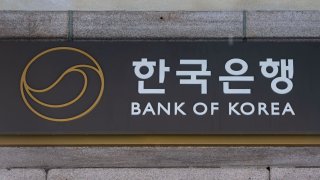
The Bank of Korea (BOK) in Seoul on Dec. 28, 2024.
- The Bank of Korea held its benchmark policy rate at 3% in a surprise move so as to assess changes in domestic and external economic conditions
- The BOK's decision surprised economists polled by Reuters, which were expecting a 25-basis-points cut.
- The BOK also said that GDP growth would "highly likely" miss its 2024 and 2025 forecasts.
South Korea's central bank Thursday held its benchmark policy rate at 3% in a surprise move, opting to assess changes in domestic and external economic conditions after having delivered two back-to-back cuts in its previous meetings.
Economists polled by Reuters had estimated a 25-basis-points cut.
In its statement, the BOK said that while inflation had stabilized and household debt had slowed down, "downside risks to economic growth have intensified and the volatility of exchange rates has increased due to the unexpected political risks that have recently escalated."
We've got the news you need to know to start your day. Sign up for the First & 4Most morning newsletter — delivered to your inbox daily. Sign up here.
The bank also said that uncertainty has also increased due to "changing domestic political situation and economic policies in major countries."
The BOK's move comes amid political turmoil in the country, with impeached President Yoon Suk Yeol being arrested Wednesday, a first for a sitting South Korean president.
South Korea's Kospi was up 1.25% after the decision, while the small-cap Kosdaq index rose 1.69%. The South Korean won strengthened about 0.3% to trade at 1,450.27.
Money Report
Alex Holmes, research director for Asia at the Economist Intelligence Unit told CNBC's "Squawk Box Asia" immediately after the decision that it was a "very tricky" decision for the bank.
"I mean, on the one hand, even before all of this political uncertainty, the economy wasn't necessarily doing very well. Yes, pockets of the export sector were very, very hot. You know, chips, semiconductors, electronics, but other exports were doing really not very well at all," Holmes said.
"And actually the domestic economy was struggling to gain momentum. So it was kind of a really dovish background for growth, but at the same time, it has to balance the fact that the currency has sold off really quite markedly," he added.
The won has fallen more than the Japanese yen since the start of October, despite the fact that the BOK has a smaller interest rate differential compared to the U.S. Federal Reserve, Holmes added.
At the same time, Holmes noted that 2024 was the first year that household debt had came down as a percentage of GDP, and the BOK will not want to cut rates too quickly to prevent a rebound.
GDP 'highly likely' to miss forecasts
In its statement, the central bank said that South Korea was "highly likely" to miss the BOK's full year GDP growth forecasts of 2.2% for 2024 and 1.9% for 2025, respectively.
The central bank added that "export growth is expected to slow and domestic demand is forecast to recover at a slower pace than expected due to deteriorating consumer sentiment."
The BOK noted that in December, while export growth had "somewhat increased", consumption recovery had weakened, and construction investment "remained sluggish."
Furthermore, the central bank also said that "high uncertainties remain along the future path of economic growth", due to changes in domestic politics, economic stimulus measures, as well as the policies of the incoming Trump administration.






